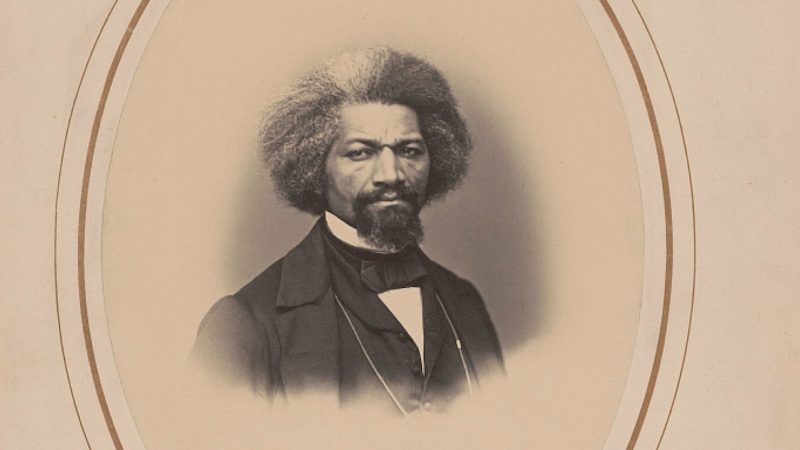Frederick Douglass on Liberty, Slavery, and the Fourth of July
"Interpreted as it ought to be interpreted, the Constitution is a glorious liberty document."

On July 5, 1852, the abolitionist leader Frederick Douglass delivered one of the greatest speeches of his long and storied career. Titled "What to the Slave Is the Fourth of July?," Douglass' speech contained both a searing denunciation of American slavery and a rousing defense of the libertarian principles coursing through the Constitution and the Declaration of Independence. "Interpreted as it ought to be interpreted," Douglass thundered from the stage, "the Constitution is a glorious liberty document."
In my view, there's no such thing as a bad day to reflect on the wisdom of Frederick Douglass—but July Fourth is perhaps a better day for it than most. So as a way of both honoring Douglass and marking the anniversary of his remarkable July Fourth speech, here are two stories from the Reason archives which examine the life and legacy of this indispensable American hero.
Frederick Douglass, Classical Liberal
It's true that Frederick Douglass simultaneously championed both civil rights and economic liberty. But the proper term for that combination isn't Social Darwinism; it's classical liberalism. The central component of Douglass' worldview was the principle of self-ownership, which he understood to include both racial equality and the right to enjoy the fruits of one's labor.
Consider the remarkable 1848 letter Douglass wrote to his old master, the slaveholder Thomas Auld. It rings out repeatedly with the tenets of classical liberalism. "You are a man and so am I," Douglass declared. "In leaving you, I took nothing but what belonged to me, and in no way lessened your means for obtaining an honest living." Escaping from slavery wasn't just an act of self-preservation, Douglass maintained; it was an affirmation of his unalienable natural rights. "Your faculties remained yours," he wrote, "and mine became useful to their rightful owner."
Douglass struck a similar note in his powerful 1852 speech "What to the Slave Is the Fourth of July?" Evoking John Locke's famous description of private property emerging from man mixing his labor with the natural world, Douglass pointed to slaves "plowing, planting and reaping, using all kinds of mechanical tools, erecting houses" as proof that they too deserved the full range of natural rights. "Would you have me argue that man is entitled to liberty? That he is the rightful owner of his own body?" Douglass asked his mostly white audience. "There is not a man beneath the canopy of heaven, that does not know that slavery is wrong for him."
What Frederick Douglass Teaches Us About American Exceptionalism and the Growth of Freedom
Douglass' genius was not in hailing or excoriating American in hyperbolic terms. Plenty of people before and after him have done that. To simply assert that the United States is the either most perfect or most depraved nation is a form of exceptionalism, to be sure. But it is also an indulgent gesture that presumes that we can't redeem ourselves or ever be held in error.
I think what resonates to this day is that Douglass was able to place America not simply in an international context but also to recognize that embracing freedom and liberty is a process that will continue to unfold and expand (or contract) over time.
The United States has much to be ashamed of as a nation and much to celebrate. But as we hurtle through history, what we need more than anything is a compass by which to chart future actions. Douglass' life and writings help provide that in a way few other examples can.


Show Comments (147)